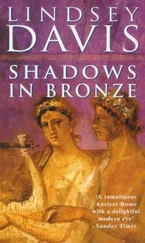Lindsey Davis - Master and God
Здесь есть возможность читать онлайн «Lindsey Davis - Master and God» весь текст электронной книги совершенно бесплатно (целиком полную версию без сокращений). В некоторых случаях можно слушать аудио, скачать через торрент в формате fb2 и присутствует краткое содержание. Жанр: Исторические приключения, на английском языке. Описание произведения, (предисловие) а так же отзывы посетителей доступны на портале библиотеки ЛибКат.
- Название:Master and God
- Автор:
- Жанр:
- Год:неизвестен
- ISBN:нет данных
- Рейтинг книги:3 / 5. Голосов: 1
-
Избранное:Добавить в избранное
- Отзывы:
-
Ваша оценка:
- 60
- 1
- 2
- 3
- 4
- 5
Master and God: краткое содержание, описание и аннотация
Предлагаем к чтению аннотацию, описание, краткое содержание или предисловие (зависит от того, что написал сам автор книги «Master and God»). Если вы не нашли необходимую информацию о книге — напишите в комментариях, мы постараемся отыскать её.
Master and God — читать онлайн бесплатно полную книгу (весь текст) целиком
Ниже представлен текст книги, разбитый по страницам. Система сохранения места последней прочитанной страницы, позволяет с удобством читать онлайн бесплатно книгу «Master and God», без необходимости каждый раз заново искать на чём Вы остановились. Поставьте закладку, и сможете в любой момент перейти на страницу, на которой закончили чтение.
Интервал:
Закладка:
‘Oh you do like a laugh!’ Felix and Fortunatus chortled.
Gaius wrote a new will.
‘Everything will come to you, Lucilla. Listen; you won’t like this, but to make it easy legally, I named you my wife.’
‘Then we are heading for divorce.’
He gazed at her, with that wry tightening of muscle at one end of his mouth that Lucilla knew so well. ‘Just go along with this, precious.’ He produced a gold ring. A woman’s wedding ring. ‘Wear this to look good.’
He saw Lucilla’s expression. ‘How many of your wives — ?’
‘Be easy. The last person who wore that ring was my mother, Clodia.’
Lucilla knew how he thought of his mother. She did try it on. ‘I am supposed to accept this for the child?’
‘Let our child be born a citizen! If anything should happen to me, I want to think you are both provided for — otherwise the state will deny your rights and snaffle everything.’
‘Nothing is going to happen to you.’
‘Not if I can help it… I found this, when I was burrowing.’ Gaius produced an elderly tablet, the wood stained and the wax hard. It was from his time in the vigiles, and on it in his handwriting was her name. ‘ Flavia Lucilla; some girlie who made an impression on me in the vigiles. Look, I never smoothed it over in nearly twenty years.’
‘Oh Gaius, why?’
‘I didn’t know.’ He grinned at her. ‘But I know now.’
He still had a handsome profile, and Lucilla still thought he was too aware of it.
34
On the first of September new consuls were sworn in.
The conspiracy revived. They had considered the mid-year consuls unsympathetic to their aims: one with a military background had worked with Domitian closely in Pannonia, and another came from Reate, Vespasian’s birthplace, the Flavian heartland whose politicians were intensely cliquey. Both men looked dangerous to the plotters. With two powerful consuls against them, they felt stymied.
Those consuls were replaced for the last four months of the year by Calpurnius, whom nobody knew much about although they knew nothing against him, and a much healthier prospect: Caesius Fronto. He was the son or adopted son of the famous lawyer and senator, Silius Italicus, who was now swelling the ranks of retired poets in Campania; Italicus was writing an epic about the Carthaginian war, a work which was bound to involve reminiscing about the good old days when politicians had sanity and integrity. He came from Patavium, birthplace of the martyred philosopher Thrasea Paetus; this town had produced many members of the stoic opposition, men who tended to meet and collaborate when they went to Rome.
The son, Fronto, mingled with those men, held the same views and was, like others before him, awarded a consulship by Domitian to mitigate his hostility. Parthenius believed in Fronto as his ideal controller of the Senate if the plot went ahead.
That finally seemed likely. Flavia Domitilla’s steward Stephanus suddenly learned he was accused of theft. Everyone knew what that meant. He was next up for banishment, if not execution. He approached Parthenius and offered to carry out Domitian’s murder.
Stephanus looked suitable. So far, he still worked at the palace, so he could get close to the Emperor. Stephanus was angry enough and strong enough. He still raged at the injustice to his mistress and her family; he loathed Domitian. With both career and life under threat, Stephanus had nothing to lose. They would have to act fast though, because of the theft accusations. Delay only increased the chance of discovery.
Domitian was in Rome. That was what they wanted. He was officiating at the Roman Games which, ironically, began on the fourth of September, an extra day that had been added in honour of the murdered Julius Caesar. The Roman Games ran for over two weeks, until the nineteenth; on the thirteenth, the September Ides, fell the important anniversary of the founding of the Temple of Capitoline Jupiter, which Domitian would obviously want to honour. By coincidence, Titus had died on the Ides of September, so the fourteenth, which by another grim coincidence was traditionally a black day in the calendar, had become Domitian’s own anniversary as Emperor. So he had a lot to celebrate — while others were also thinking about his anniversary and evaluating his reign bleakly.
The period of the Roman Games would be their last chance. Insiders knew that as soon as these Games ended, he would slip away. An enormous expeditionary force of five legions plus auxiliaries had been assembled for the next war on the Danube. Domitian had been closely involved in planning and he intended to go. Militarily, time was tight. Even if he dashed off straight after the Games ended, he could not arrive in Pannonia until the start of October; that allowed a maximum of six weeks before winter set in and campaigning had to end. An initial excursion across the Danube had in fact already started, under an experienced commander called Pompeius Longinus, who had years of frontier service.
That could be helpful. Once Longinus committed troops, he was unlikely to pull them back even if he heard that the Emperor had died. The Danube army was the dangerous one for the plotters, so it was good to have it tied up in an active campaign. The legions in Britain and the east were tricky, but hopefully too far away to cause trouble.
They still had no candidate to replace Domitian. Their objective of a smooth transfer of power depended on producing someone who would be willing and acceptable. Frantic manoeuvring began.
The Games, with their bustle and socialising, provided good cover. They were triumphal, beginning with a parade, then dancing, boxing, athletics and drama; the finale was four days of chariot races in the Circus Maximus, which the Emperor was currently repairing after fire damage. Domitian would watch from his splendid new viewing gallery on the Palatine, which dominated the great southern bulwark side of the imperial palace, right above the Circus. As fire-walkers and rope-dancers entertained vast crowds, amidst the constant scent of flowers, smoke, donkey shit and street food, everyone important was conveniently in Rome. Associates could meet and mutter, without causing suspicion. Canvassing went ahead apace.
One after another, the most prominent men said no. Intriguingly, none reported the plot to Domitian.
No one, said Domitian, ever believed in plots until the victim was dead. He believed. He was all too superstitious. He felt convinced people were out to get him — a reasonable fear since it was true.
To the agonised Emperor, Rome became full of portents. He had dedicated the new year to the care of the Goddess of Fortune but the omens were dreadful. That summer, lightning struck several monuments, among them the Temple of the Flavians, the Temple of Jupiter and the new palace; a flash damaged Domitian’s bedroom, which he took as particularly significant. Had the Emperor not been so insanely superstitious, no one would have thought anything of all this. It was approaching the autumnal equinox. The Mediterranean often had thunderous storms. Flurries of severe weather came up suddenly, passed quickly, left the air fresher.
Astrologers prophesied when the Emperor would die; they knew his fixation. He had such black thoughts, they could safely make such forecasts, even though producing imperial horoscopes was illegal. If nothing happened on the day they named, their predictions would be quickly forgotten, especially by Domitian. Anyway, he believed that if he knew in advance what was planned for him, as a clever schemer he could outwit the fates. To prove it, he challenged one prognosticator to foretell his own death; on hearing it would be soon, and that the man expected to be torn apart by dogs, Domitian crisply had him killed and arranged for his funeral to be conducted very carefully.
Читать дальшеИнтервал:
Закладка:
Похожие книги на «Master and God»
Представляем Вашему вниманию похожие книги на «Master and God» списком для выбора. Мы отобрали схожую по названию и смыслу литературу в надежде предоставить читателям больше вариантов отыскать новые, интересные, ещё непрочитанные произведения.
Обсуждение, отзывы о книге «Master and God» и просто собственные мнения читателей. Оставьте ваши комментарии, напишите, что Вы думаете о произведении, его смысле или главных героях. Укажите что конкретно понравилось, а что нет, и почему Вы так считаете.












